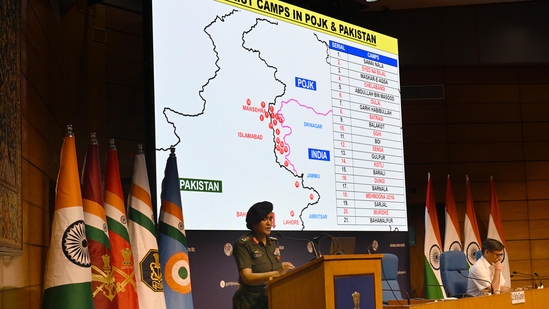Turkey and Azerbaijan the global diplomatic landscape is once again feeling the heat as tensions between India and Pakistan flare up. In the aftermath of India’s major airstrike operation, dubbed Operation Sindoor, several nations have responded. While countries like Qatar have called for calm and restraint, Turkey and Azerbaijan have openly expressed support for Pakistan, signaling a possible shift in regional alliances.
What Happened in Operation Sindoor?
India launched Operation Sindoor on May 6, 2025, targeting multiple terror camps and infrastructure in Pakistan and Pakistan-administered Kashmir. This military action came in direct retaliation for the horrific April 22 terrorist attack in Pahalgam, Jammu and Kashmir, where 26 Hindu pilgrims were killed during a religious tour. Indian intelligence agencies have blamed terror outfits like Jaish-e-Mohammed and Lashkar-e-Taiba, which operate from Pakistani territory.
According to Indian defense sources, the airstrikes were carefully planned to avoid civilian casualties and only targeted terror-related infrastructure. The Indian government stated that the strikes were essential for ensuring national security and preventing future attacks on Indian soil.
Turkey Strongly Backs Pakistan
Turkey, a longstanding ally of Pakistan, swiftly condemned India’s actions. In an official statement, Turkey’s Foreign Ministry said the airstrikes “increase the risk of an all-out war in the region.” They added that such operations were provocative and that targeting civilian areas or civilian infrastructure would only escalate the conflict further.

Turkey called upon both countries to “act with common sense” and avoid actions that could cause wider instability in the region. Interestingly, Turkey also supported Pakistan’s demand for a thorough international investigation into the April 22 attack, rather than India’s unilateral military response.
This stance underscores Turkey’s consistent foreign policy of siding with Pakistan on the Kashmir issue, often framing the conflict as a human rights concern and calling for mediation by international bodies.
Azerbaijan Echoes Support for Pakistan
Azerbaijan, a close military and strategic partner of Turkey, also sided with Pakistan in its reaction to the Indian strikes. In a carefully worded statement, the Azerbaijani government condemned the air attacks that reportedly resulted in civilian casualties. They expressed solidarity with Pakistan, offered condolences to the families of the victims, and extended wishes for the speedy recovery of the injured.
While Azerbaijan has traditionally kept a lower profile in South Asian affairs, its alignment with Turkey and support for Pakistan in this instance reveals a coordinated diplomatic message. It also highlights the deepening ties between Azerbaijan and Pakistan, including recent defense agreements and joint military exercises.
Qatar Appeals for Peace and Restraint
Qatar, a Gulf nation with strong trade ties to both India and Pakistan, struck a more neutral tone. Doha’s Ministry of Foreign Affairs expressed deep concern over the rising tensions and called on both nations to avoid further escalation. Qatar emphasized the need for dialogue and diplomatic solutions, stressing that continued violence would not serve the interests of either side.
Qatar’s statement is seen as an attempt to prevent regional destabilization, especially since any large-scale conflict between nuclear-armed neighbors like India and Pakistan could have serious repercussions for the wider Middle East and Gulf regions.
India’s Justification and Domestic Reactions
India has defended its actions as necessary and proportionate. Government officials, including senior ministers, stated that Operation Sindoor was aimed strictly at terror bases, not the Pakistani military or civilian areas. India also emphasized that this was a “pre-emptive” strike to prevent future terror attacks on its soil.
Domestically, the Indian public has largely supported the government’s response. Political parties across the spectrum praised the armed forces, and candlelight vigils were held in several cities to honor the victims of the Pahalgam massacre. The Indian media widely covered the operation, portraying it as a strong message against cross-border terrorism.
Global Reactions: A Mixed Bag
International reactions have been mixed. While some countries have called for de-escalation, others have shown sympathy for India’s position on terrorism. The United States and several European nations have urged both India and Pakistan to act responsibly and resolve their differences through dialogue. Russia and China also appealed for calm, although neither took a strong stance in favor of either side.
The United Nations Secretary-General issued a general statement expressing concern and urging restraint, without attributing blame. Meanwhile, human rights organizations have called for transparency and independent verification of civilian casualties in the affected areas.
India-Pakistan: A Fragile Peace at Risk
India and Pakistan have a long and troubled history, with multiple wars and near-war situations over the last seven decades. The Kashmir region remains the central flashpoint in their relations. Despite various peace talks over the years, cross-border tensions and terror incidents continue to derail any progress.
The fear now is that continued tit-for-tat military responses could spiral into a larger conflict. Both nations possess nuclear weapons, and even a limited war would have disastrous consequences, not just for South Asia but for the world.
Looking Ahead: Diplomacy or Confrontation?
The coming weeks will be crucial in determining the trajectory of this crisis. While India has stated that it does not seek war and is only responding to terrorism, Pakistan has warned that it will respond to any violations of its sovereignty.
Whether the region sees a return to the dialogue table or slips further into military confrontation depends heavily on international mediation efforts. Countries like the United States, China, and Saudi Arabia may play a role in easing tensions behind the scenes.
In the meantime, civilians on both sides of the border are holding their breath, hoping that cooler heads will prevail.
Saudi Arabia’s $13M Investment Boosts Women’s Golf with PIF Global Series



